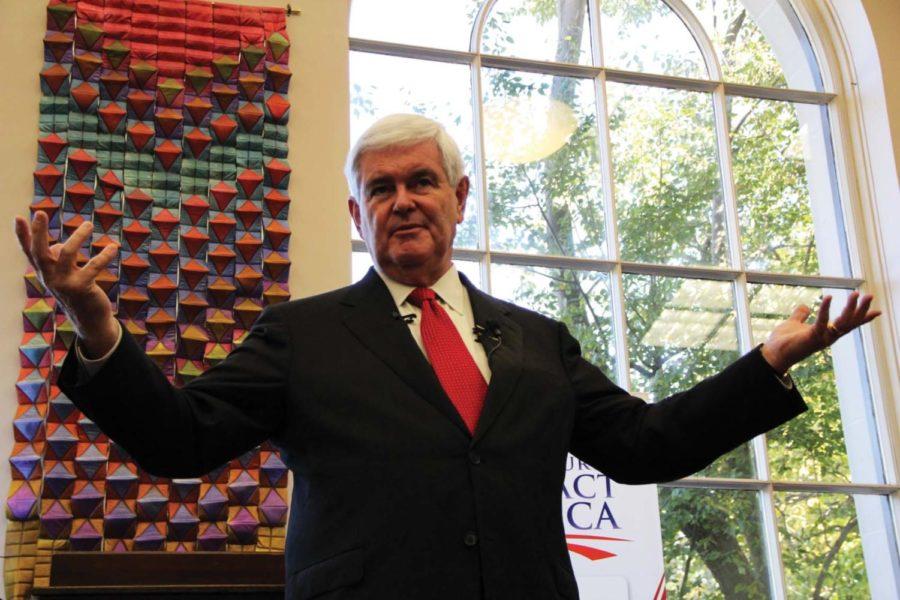Gingrich looks to revamp campaign
Photo:Emily Harmon/Iowa State Da
Newt Gingrich, 2012 presidential candidate, spoke at Iowa State on Friday, Sept. 30, in the Campanile Room of the Memorial Union, emphasizing Iowa State’s reputation for science and technology. Gingrich’s presence was part of the Presidential Caucus Series.
October 2, 2011
In an effort to revamp his campaign before the crucial Iowa caucus in early 2012, Republican presidential candidate Newt Gingrich unveiled his new “21st Century Contract with America” last week.
The plan involves several efforts his camp claims will get America back to work and on the right track. However, many have called into question whether or not this is a viable plan or simply a last-ditch effort for a campaign that has already been crippled by falling polling numbers and a mass exit of campaign staff earlier in the year.
“We are going to talk about jobs a lot, which is appealing to college students,” said Gingrich’s Iowa campaign manager Mike Kraul. “We are mapping out a plan that is going to greatly expand jobs.”
Having a post-doctoral degree in history, Gingrich is well-known for drawing upon the past to reiterate his plans for the future. His focus on science and technology in relation to innovators at Iowa State also is an asset that Gingrich is hoping will garner larger support in Iowa.
The idea for his “21st Century Contract with America” is essentially a four-part plan that includes first a set of 10 key legislative proposals highlighted by an immediate repeal of President Barack Obama’s Patient Protection and Affordable Care Act, which has been a hot-button issue for Republicans ever since its passing in March 2010. Other points in the plan include balancing the federal budget and tax cuts for small businesses in the hopes that it will spur job growth. This idea was repeated in Gingrich’s speech Friday at Iowa State in which he used the example of medical technology.
“We don’t want politicians deciding how to allocate resources,” Gingrich said. “If scientists slow down the rate of Alzheimer’s and can offset it by five years, you save between $8 to $10 trillion … and I guarantee in Washington, D.C. this will be seen as Newt’s fantasy.”
Building on this, Gingrich proposed three steps to accelerate brain science. The first part involved cutting the capital gains tax to zero percent. The second was a completely fundamental change of the Food and Drug Administration, which he claimed was hindering the delivery of crucial new drugs and other medical technology from hitting the market. Finally, he wanted to start a brand new brain science project that would accelerate the study and cure of diseases like Alzheimer’s.
“The way I would pay for it is to issue Alzheimer’s savings bonds,” Gingrich said. “If we get a five-year postponement, the first slice of the money goes to pay off those bonds.
“You save human suffering, families from health problems, and you save trillions of dollars … Places like Iowa are exactly where we should be having this conversation because a lot of the future will be invented at places like Iowa State University.”
The next part of Gingrich’s plan included a list of executive orders that he hoped to sign immediately upon assuming the residency. In his speech, he stated that more than 10 would be signed, but lacked specifics. The third part, according to his campaign website, stated, “A training program for the transition teams and the appointees who will lead the shift back to consitutional, limited government.” This, too, lacked specifics, but it seemed clear that this part of the plan was catering to the tea party base of the Republican Party, which has advocated for smaller government since Obama took office.
Finally, the fourth part of Gingrich’s plan involved developing a system for citizen involvement in government that would lead to change and sustainability in the next 10 years. Gingrich said this means putting change back into the hands of Americans.
“If we shrink the Washington bureaucracy, citizens have to get bigger,” said Gingrich. “This is a real fundamental change.”
“Gingrich is an ideas man, and we need new ideas that are outside the box,” said attendee Rick Gustafson, of Ogden.
Since his days as speaker of the House in the 1990s during the Clinton administration, many Republicans have touted Gingrich’s ability to come up with new ideas for the party in order to adjust to the current political and economic climate of the country.
“I think the overall idea of cutting through the bureaucracy and engaging people in new ideas and government being able to let that happen resonates the most with me,” Gustafson said. “And that is why I like Mr. Gingrich.”







